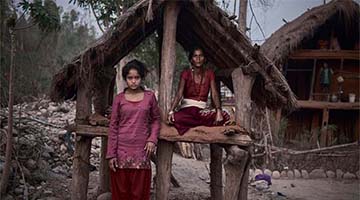About this course
This programme is ideal for educators, researchers, practitioners, policymakers, and leaders from educational settings, community and voluntary organisations, and policy sector as well as for current undergraduate students.
The MA Education and Social Justice programme at Liverpool John Moores University is ideal if you are passionate about developing knowledge, understanding and skills to address issues of equity, diversity, inclusion, and social justice. It is ideal for educators, researchers, practitioners, policy makers, and leaders from educational settings, community and voluntary organisations, and policy sector as well as for current undergraduate students.
A key focus of this programme is to equip students with requisite knowledge, skills, and strategies to tackle challenges in meeting UN Sustainable Development Goals. You will learn to question accepted theory and policy, view education from a global perspective and explore key issues such as equity, inclusion and accessibility. This programme involves critical multi-disciplinary study and deepens your understanding of education in a local and global context.
Please note this MA does not provide Qualified Teacher Status.
The programme offers you an opportunity to:
- Critically explore educational issues at the intersection of race, ethnicity, class, ability, language, gender, sexual orientation, and immigration trajectories
- Critically interrogate education policy, discourse and practice in a supportive and stretching learning community
- Explore and analyse social, political, historical, philosophical, and cultural issues in education.
- Focus on social justice practice, ethical global pedagogies, education for sustainability, and critical global citizenship education.
- Enjoy and contribute to the rich environment created by a diverse breadth of learners
What our students have to say about this course
"Building on my professional experience I applied to the course with a desire to develop and deepen my knowledge within the education field, challenge my thinking and undertake research within the SEND field.
Highlights of the course included being able to interact with other educational professionals and the quality and depth of knowledge of each lecturer. It was challenging, thought provoking and valuable to talk through issues and factors relating to education across the world and within the local community that I worked.
Undertaking the MA has been of great value as led me to undertake my Doctor of Education at LJMU and continue my growth professionally; with an aim to produce impactful research. The course was challenging but has benefited me both personally and professionally and I would recommend it to all who want to continue to progress their career." Heidi Smith, graduate
Course modules
Discover the building blocks of your programme
Further guidance on modules
Modules are designated core or optional in accordance with professional body requirements, as applicable, and LJMU’s Academic Framework Regulations. Whilst you are required to study core modules, optional modules provide you with an element of choice. Their availability may vary and will be subject to meeting minimum student numbers.
Where changes to modules are necessary these will be communicated as appropriate.
Core modules
Education and Social Justice
20 credits
20 credits
This module introduces key debates, theories and research in the study of education and social justice. The module will introduce academic convention s and will develop critical reading to critical writing skills as a basis to support student assessments across the MA.
Education for Sustainability and Critical Global Citizenship Education
20 credits
20 credits
This module explores pedagogies of hope, including those referred to in the Dublin Declaration 2020 and from Global South (e.g., peace education, human rights education, climate justice education) used by educators to teach and act for a just and sustainable world.
Racial Inequalities in Education
20 credits
20 credits
Making use of multiple disciplinary frameworks by introducing debates in class, this module will examine educational settings as a site where racial and ethnic inequalities are simultaneously sustained and resisted. The module syllabus will consider the history of exclusion of racially minoritised groups, and how educational researchers have utilised various conceptual frameworks to understand the negative and limiting school experiences of children from racially oppressed communities. It examines possible counternarratives and interventions created through educational research, policymaking and social activism that may resolve, repair and redress long-term racial bias and inequalities
Global Childhoods, Youth and Communities
20 credits
20 credits
This module explores key themes within childhood, youth and community education research, policy and practice. This includes developing an understanding of some of the challenges faced by children, young people and communities including exclusion, rights and representation, safeguarding, non-formal approaches to education and social justice.
Critical Perspectives of Gender and Disabilities in Education
20 credits
20 credits
This module will explore theoretical frameworks in relation to gender, sexuality and disability (e.g., disability, difference, diversity, rights, capabilities, neurodiversity, crip). It will also examine educational experiences and outcomes at various intersections including curriculum, options and attainment.
Critical Approaches to Research Design
20 credits
20 credits
This module develops skills to recognise and evaluate core research strategies and methods in educational research. A compulsory element is passing LJMU Research Ethics Module online. This will include exploring ontological (worldview) and epistemological (knowledge) perspectives, research approaches, methods and tools. These will be considered in the context of research ethics and contexts for wider educational research topics. This will culminate in the development of proposal for a small-scale research project that can be empirically and or theoretically informed. This will form the basis of the dissertation. This module must be passed before taking the dissertation.
Dissertation
60 credits
60 credits
The module will provide orientation to students on how to address different aspects/stages of dissertation writing. The module requires significant independent study. Students will have an opportunity to work closely with allocated dissertation supervisor to produce their dissertation.
Your Learning Experience
An insight into teaching on your course
Study hours
The course consists of six core modules (20 credits each) and one dissertation module (60 credits) - all at Level 7.
You can study full-time or part-time. Modules are delivered across two semesters during the weekday afternoon and early evening in 3-hour sessions plus some Saturday sessions. The dissertation module requires significant independent study during spring and summer months with submission in September.
Teaching methods
This course will be taught via workshops, seminars, lectures, online sessions, blended learning, face-to-face sessions, and tutorials (include module specific and personal tutorials). You will have the chance to listen and learn from experienced practitioners and professionals as part of invited speaker sessions as well as visit different educational sites. Purposeful blended learning would be key in delivering a rich and creative curriculum in an accessible manner.
How learning is monitored on your programme
To cater for the wide-ranging content of our courses and the varied learning preferences of our students, we offer a range of assessment methods on each programme.
We offer a wide range of assessment methods including essays, presentations, portfolios, report writing, and critical reflection on professional practice. There is a strong emphasis on the application of key ideas and learning developed in different modules.
Where you will study
Based in the Education Building in the heart of the Mount Pleasant campus, the School of Education features a wide range of cutting-edge facilities, including a pedagogy room, lecture rooms, computing facilities and a nearby Outdoor Learning Zone for our Natural Curriculum projects. Students also benefit from independent study spaces, a close-by cafeteria and library, and access to student welfare and support.
Course tutors

Dr Sana Rizvi
Programme leader
Dr Sana Rizvi is a Senior Lecturer in Education and Early Childhood Studies and a Joint-Programme Leader for MA Education and Social Justice at Liverpool John Moores University. Her research centres on the educational experiences of minoritised communities at various intersections, exclusionary processes that affect minoritised communities, and the experiences of BIPOC staff and students within a UK HE context. She is passionate about teaching on the subjects of racial inequalities in education, critical perspectives on disability studies and inclusive education, and on qualitative methodologies. She has presented her research at several international and national conferences, and has also published research in the field of research methods, racial inequality and disability studies.
Career paths
Further your career prospects
LJMU has an excellent employability record with 96% (HESA 2018) of our postgraduates in work or further study six months after graduation. Our applied learning techniques and strong industry connections ensure our students are fully prepared for the workplace on graduation and understand how to apply their knowledge in a real world context.
This programme offers excellent opportunities to enhance your employability and career progression through your developing skills and confidence. You will benefit from our strong and established relationships with employers in education and other fields.
As a graduate you will be able to enter or progress in a range of careers where education is central to practice and organisational purpose. You may go on to undertake roles in: policy work; arts education; educational leadership; community-based education; learning, development and support; schools; adult, further and higher education; local authorities/central government; diplomacy and international projects; educational research; NGOs and educational consultancy and educational pathways in to EdD and PhD.
Where are our MA graduates now?
“I completed my MA at LJMU in 2019, which ended up being a before-and-after moment in my career. The course was engaging and relevant to today’s local and global challenges in education. Spending eight weeks in Brazil on fieldwork within an Indigenous community/school for my dissertation was the highlight of the year, as well as a key experience for what was to come after.
All in all, this MA and its supportive teaching staff were vital in my development and pushed me to pursue further studies. At the moment, I am a fully funded PhD candidate in Latin American studies at University of Liverpool where I am carrying out a continuation project of what was my LJMU MA fieldwork and dissertation looking at alternative models of education with a focus on Indigenous peoples in Brazil.” Naiara Unzurrunzaga, graduate
Tuition fees and funding
- Part-time per credit:
- £46.65
The University reserves the right to increase tuition fees in accordance with any changes to the maximum allowable fees set by the UK Parliament. In the event of such a change, any fee increase will be subject to a maximum cap of 10% of the total course cost as originally stated at the time of your offer.
Fees
The fees quoted at the top of this page cover registration, tuition, supervision, assessment and examinations as well as:
- library membership with access to printed, multimedia and digital resources
- access to programme-appropriate software
- library and student IT support
- free on-campus wifi via eduroam
Additional costs
Although not all of the following are compulsory/relevant, you should keep in mind the costs of:
- accommodation and living expenditure
- books (should you wish to have your own copies)
- printing, photocopying and stationery
- PC/laptop (should you prefer to purchase your own for independent study and online learning activities)
- mobile phone/tablet (to access online services)
- field trips (travel and activity costs)
- placements (travel expenses and living costs)
- student visas (international students only)
- study abroad opportunities (travel costs, accommodation, visas and immunisations)
- academic conferences (travel costs)
- professional-body membership
- graduation (gown hire etc)
Funding
There are many ways to fund postgraduate study for home and international students. From loans to International Scholarships and subject-specific funding, you’ll find all of the information you need on our specialist postgraduate funding pages.
Please be aware that the UK’s departure from the EU may affect your tuition fees. Learn more about your fee status and which tuition fees are relevant to you.
Entry requirements
You will need:
Qualification requirements
Undergraduate degree
An undergraduate degree (lower second-class level or above).
Alternative qualifications considered
We welcome international students with relevant undergraduate qualifications
Further information
- Extra Requirements
-
RPL
Candidates already holding a Postgraduate Certificate, Diploma or other M-level qualifications deemed by the Programme Leaders to be equivalent to respective parts of the MA programme maybe permitted to enter with exemptions, subject to the University's regulations and Advanced Standing in Postgraduate Awards and with the approval of the University Recognition Group. The Recognition of Prior Education and Learning (RP-EL) system will be explained if required.
International requirements
IELTS
Non-UK students will be required to possess certification of English at IELTS 6.5 level (minimum 6.0 in each component) or equivalent qualification. Applicants who have studied and successfully passed a UK-based degree within the previous 24 months are exempt from such requirements
Further information
- Extra Requirements
-
RPL
Candidates already holding a Postgraduate Certificate, Diploma or other M-level qualifications deemed by the Programme Leaders to be equivalent to respective parts of the MA programme maybe permitted to enter with exemptions, subject to the University's regulations and Advanced Standing in Postgraduate Awards and with the approval of the University Recognition Group. The Recognition of Prior Education and Learning (RP-EL) system will be explained if required.
Please Note: All international qualifications are subject to a qualification equivalency check.
How to apply
Securing your place at LJMU
To apply for this programme, you are required to complete an LJMU online application form. You will need to provide details of previous qualifications and a personal statement outlining why you wish to study this programme.
Your university life
From accommodation and academic support to clubs and societies. Find out what LJMU has to offer.
Related Links
Talk to our students
Connect with a current LJMU student for advice and guidance on university life, courses and more.
See what our students are saying
At LJMU we want you to know you’re making the right choice by studying with us. You can see what our students are saying about their experience with us through their reviews on the following websites:
Related Links
News and views
Browse through the latest news and stories from the university
The University reserves the right to withdraw or make alterations to a course and facilities if necessary; this may be because such changes are deemed to be beneficial to students, are minor in nature and unlikely to impact negatively upon students or become necessary due to circumstances beyond the control of the University. Where this does happen, the University operates a policy of consultation, advice and support to all enrolled students affected by the proposed change to their course or module.


















